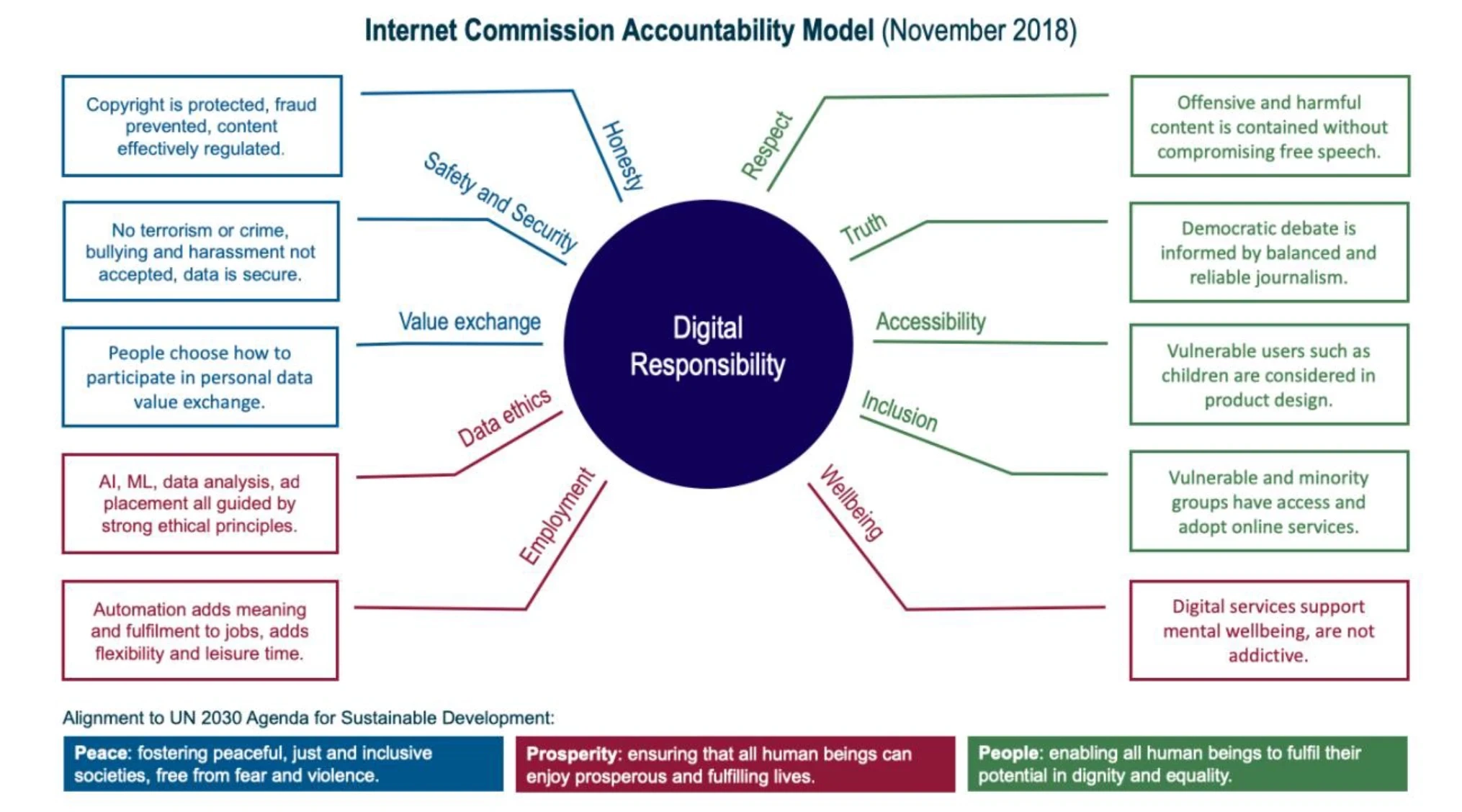Policy briefing: “Global Digital Goals” can give digitalisation a new direction.
Inspired by the 2030 United Nations Agenda for Sustainable Development.
Published November 2018
As we come to understand the unintended negative consequences of digitalisation, it is necessary to set out what good digitalisation looks like. Industry and others must urgently settle on a new direction and establish an agenda for action.
Key take-aways
Digital technologies are reshaping how people live their lives and the fundamentals of economies around the world. It is vital to direct the kind of society we want this to create. To this end:
- A constructive dialogue between digital platforms, wider industry, governments and civil society is necessary to direct this change in the public interest.
- The limitations of digital literacy and critical thinking must be explored and understood: the architecture of choice is such that agency is limited by processes. institutional structures and
- Corporate accountability is vital: a new breed of trusted experts and intermediaries will be necessary to represent individual and collective interests.
- Internet platforms and service providers have much to do: current transparency efforts lack the ambition and oversight necessary to rebuild consumer confidence and sustain license to operate.
- The promise of AI in tackling online harms should not be overstated. Risks to human rights including freedom of speech must be mitigated.
- Breakthroughs in data portability are urgent in order to enable widespread, affordable and equitable access to digital services.

For an Internet of people, prosperity and peace
In October 2018, together with the Centre for European Policy Studies, the Internet Commission convened leading academics, EU policymakers and business leaders to discuss first ideas. The discussion was shaped and inspired by the UN Agenda for Sustainable Development and its vision of a better world. We have now created a version of the Internet Commission’s Accountability Model which maps Digital Responsibility issues to three key areas of the UN agenda: people, prosperity and peace.
Global Digital Goals – first ideas
Which principles should now be adopted by industry to guide its development and contribution over the next twelve years?
These first ideas draw on suggestions from organisations including the Atonium European Institute for Science, Media and Democracy [1], the Conscious Advertising Network [2], Telefónica [3] , the Tony Blair Institute for Global Change [4] and the World Wide Web Foundation [5].
People: Respect, Truth, Accessibility, Inclusion
- Commitment to promoting human dignity and well-being
- Ensuring that online content reflects the diversity of its creators and the wider public
- Establishing and consistently enforcing community standards; reporting on exceptions
- Not funding hate speech or deliberately misleading ‘fake news’
- Making the Internet affordable, accessible and inclusive so that everyone can help shape it and no one is left behind.
Prosperity: Wellbeing, Employment, Data Ethics
- Developing technologies that support the best of humanity and challenge the worst
- Justice: promoting prosperity and preserving solidarity
- Responsibility and commitment to social development
- Respecting people’s privacy and personal data, putting them in control of their lives online
- Designing online experiences which give people genuine choices about how to engage
Peace: Value Exchange, Safety and Security, Honesty
- Clarity about how services are funded
- Enabling autonomy for citizens: the power to decide
- Organisations to set strategy with the wellbeing of users and best interests of society in mind
- Safety by design for new products and forms of marketing
- Fair, rules-based value exchange in advertising and personal data.
Conclusions
Advertising fraud, misinformation and personal data leaks suggest a need for regulation. The processes by which online content is created, controlled, distributed, targeted, curated and promoted, are complex and dynamic: they incorporate high levels of automation and are driven by multi-sided business models. Lawmakers are ill-equipped to regulate global processes that only a small number of private actors know and understand.
It therefore falls to industry at large to lead the way, working with Internet platforms and service providers to demonstrate progress. A robust, international and independently overseen accountability model must be established in order to ensure that the social, economic and cultural benefits of digital technologies can be realised, for all.
Sources:
[1] Atonium European Institute for Science, Media and Democracy – “AI4People - An Ethical Framework for a Good AI Society: Opportunities, Risks, Principles, and Recommendations”: http://bit.ly/2K6a1Z5
[2] Conscious Advertising Network manifestos: http://bit.ly/2E6AfKK
[3] Telefónica – “A Manifesto for a New Digital Deal”: http://bit.ly/2yw9ev8
[4] Tony Blair Institute for Global Change – “A New Deal for Big Tech: Next-Generation Regulation Fit for the Internet Age”: http://bit.ly/2Pw0wbu
[5] World Wide Web Foundation – “Contract for the Web”: http://bit.ly/2K9sm7S
Want to learn more? We’re happy to help.